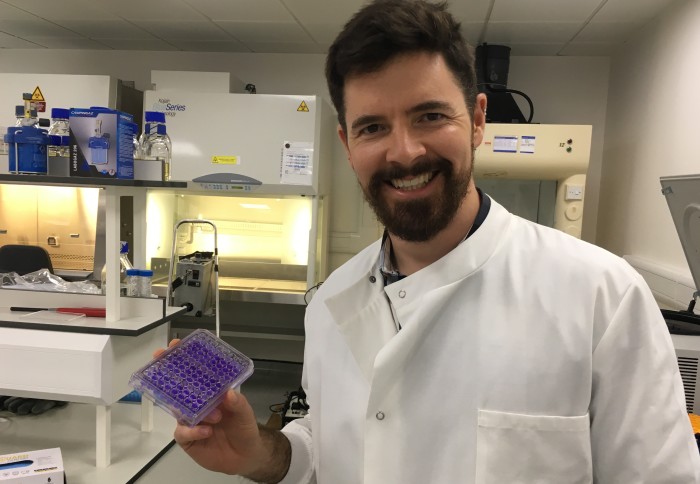Dr Luke Allsopp awarded Academy of Medical Sciences Springboard Award

Dr Luke Allsopp has been named as one of the winners of the Academy of Medical Sciences Springboard Awards 2021.
The AMS Springboard Award offers a package of support to biomedical researchers at the start of their first independent post to help launch their research careers. The scheme seeks to embrace the breadth of biomedical research and welcomes applications that contribute to the Academy’s mission to improve health through research.
"I want to do this project to understand more of the biology of bacteria when they are competing against other bacterial species and how this contributes to their ability to cause disease" Dr Luke Allsopp
Dr Luke Allsopp's research focuses on biofilm formation factors, Gram negative bacterial secretion systems and virulence of pathogens. This award is for a project looking at Cystic Fibrosis entitled ‘Bacterial battles in the bid to dominate in chronic respiratory infections - colonisation warfare of Pseudomonas aeruginosa respiratory strains’.
After Luke was awarded this honour I asked him a few questions on his current research, his plans for the future and his advice to the next generation of scientists.
What project have you been awarded the AMS Springboard for?
I have been awarded an AMS Springboard award to investigate how the bacterium Pseudomonas aeruginosa dominates in chronic respiratory infections. These infections are common in people with Cystic Fibrosis. In people with Cystic Fibrosis cells do not work properly. This is especially so in the lungs where impaired airway function weaken the body’s defences to microscopic organisms like bacteria. The bodies immune response to the growth of bacteria causes tissue damage, scarring and can reduce the persons quality of life and lifespan. The most common bacteria in people with Cystic Fibrosis is P. aeruginosa. Why this is so, is unknown. This project aims to characterise factors that P. aeruginosa uses to kill other competing bacteria to dominate in the lung environment.
What led you to wanting to do this project and why is it an important area to look at?
I am interested in how microbes cause disease and take over an environment. I want to do this project to understand more of the biology of bacteria when they are competing against other bacterial species and how this contributes to their ability to cause disease. This is an important area to look at as we do not understand why P. aeruginosa is the most common bacteria in people with Cystic Fibrosis.
What is the biggest challenge in your area of work?
We still do not have a clear understanding of how many bacteria cause disease. In the case of Cystic Fibrosis poor airway function is permissive to chronic bacteria colonisation leading to enhanced inflammation that is an ongoing cycle worsening disease. We know some of the factors that are important but large sections of bacterial genomes have no-known function and our understanding is incomplete. The biggest challenge in the future will be the rise of pan resistant pathogens to which we have no effective antibiotics. In addition to developing new antibiotics agents we need to understand how bacteria cause disease to target these processes as well.
Why did you become a scientist?
I have always been curious and fascinated by how things work…from how plants grow, to pulling apart my mother’s alarm clock as a child, to how tiny bacteria survive and reproduce. I think it’s this curiosity that led me to become a scientist.
Any advice to PhD students and early career researchers on a successful career in academia?
It’s not just all about the papers, yes they are important but so is being well trained, curious, helpful, well rounded, a good team player, being able to give a great talk and taking opportunities as they present themselves. Whilst doing your PhD or Postdoc think about what you want to do or where you want to go and then what steps you can take to help you get there. However, you also never quite know in which direction opportunities will come from so keep an open mind.
How do you think your area will have advanced in 20 years?
Our understanding of how microbes cause disease is continually advancing. In 20 years, I think we will understand at the molecular level what bacterial factors they use to cause disease and how our bodies fight back. I believe that this understanding will lead to scientists being able to combat pathogenic microbes by not just killing them or inhibiting their growth with antibiotics but also by targeting the factors they use to cause disease. By targeting these factors pathogens might be still present but not causing disease and then our own immune systems will be better able to clear the pathogens. These approaches will be more targeted and will prevent some of the side effects of antibiotics which kill lots of good bacteria and not just bacterial pathogens.
Find out more about applying for the AMS Springboard Award and read a full list of winners.
postgraduate Genomic Medicine at Imperial
Luke is a module lead for our postgraduate programme on Genomic Medicine. Leading on 'Application of Genomics in Infectious Disease'.
Find out more about postgraduate study options available at the National Heart and Lung Institute.
Article text (excluding photos or graphics) © Imperial College London.
Photos and graphics subject to third party copyright used with permission or © Imperial College London.
Reporter
Ms Helen Johnson
Communications Division